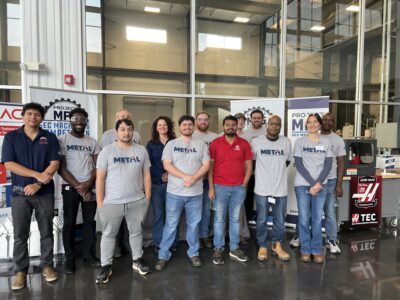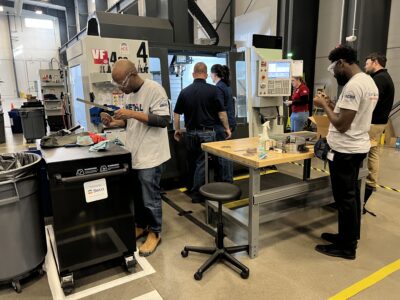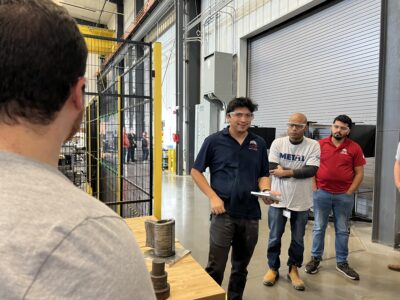 The University of Tennessee, Knoxville (UTK) recently hosted a METAL bootcamp designed to inspire and prepare the next generation of metallurgical engineers and tradespeople. METAL—short for Metallurgical Engineering Trades Apprenticeships and Learning—is a workforce development initiative led by IACMI-The Composites Institute aimed at addressing critical shortages in the U.S. defense industrial base within the forging and casting industries. The bootcamp serves as a hands-on introduction to metallurgy, giving participants a unique opportunity to learn, experiment, and envision a future in a vital field.
The University of Tennessee, Knoxville (UTK) recently hosted a METAL bootcamp designed to inspire and prepare the next generation of metallurgical engineers and tradespeople. METAL—short for Metallurgical Engineering Trades Apprenticeships and Learning—is a workforce development initiative led by IACMI-The Composites Institute aimed at addressing critical shortages in the U.S. defense industrial base within the forging and casting industries. The bootcamp serves as a hands-on introduction to metallurgy, giving participants a unique opportunity to learn, experiment, and envision a future in a vital field.
“I am excited about this new partnership between the College of Arts and Sciences School of Art Sculpture program and the Tickle College of Engineering and Materials Science department,” said Jason Brown, a UT art professor who worked with IACMI to facilitate the METAL bootcamp at the university.
“The IACMI METAL bootcamp is creating new opportunities for University of Tennessee students and faculty to share research and teaching focused on metalcasting and metallurgy. This workforce readiness program also extends our academic training and research into the community through the land grant mission of UT.”
University Students Discover a Passion for Metal

University of Tennessee School of Art foundry consultant Ronda Wright was also instrumental in the METAL bootcamp, preparing, advising and working with participants of various backgrounds as they learned to cast metal.
“I think my first iron pour was in about 2005, and I was immediately captivated,” Wright said.
The experience ignited her passion in foundry processes, from mold making to operating the furnaces and pouring molten metal. After pouring iron for the first time, she switched her undergraduate major at the UT to a Bachelor of Fine Arts, focusing on metal sculpture. While still in school, she began doing iron and bronze pours at community events around the country.
After graduation, she continued in professional practice, opening a metal shop in Knoxville that focused on metal fabrication, casting and forging. She attended graduate school at Alfred University in New York before returning to the UT as a senior academic and professional development advisor, visiting studio artist, lecturer and foundry consultant.
“The METAL bootcamp was a unique opportunity here because it highlights the importance of engineering, craft, skilled labor and manufacturing,” Wright said. “My educational path was a long journey. I was unaware of the many opportunities in professional foundry and welding that don’t require a degree in higher education. It is important in academia to acknowledge and support other paths in successful and fulfilling careers in industry-led fields like metal work.”
Metallurgy plays an essential role in the modern world, powering industries from aerospace to renewable energy. However, a growing skills gap threatens the sector’s ability to meet demand. The METAL bootcamp is specifically designed to tackle this issue by engaging students, recent graduates, and early-career professionals in an immersive educational experience.
The event featured a mix of classroom instruction, hands-on skills building, and collaborative problem-solving activities. Participants explored topics such as metal properties, heat treatment processes, and the role of advanced manufacturing techniques in the industry. Through these experiences, attendees not only gained technical skills but also a broader appreciation for metallurgy’s role in shaping innovation.
“My encounter with the METAL bootcamp was such a great experience,” said Francis Akosah, a graduate student at UT’s School of Art.
Akosah began working in metal art in Ghana, before moving to the United States to pursue his master’s degree in fine arts. Akosah assisted Wright in leading bootcamp sessions while participating as well.
“I especially enjoyed working with the engineers and learned a lot from them,” Akosah said. “We approach metal pouring with two different methods — artists are more traditional and engineers are more contemporary. It was like two languages, but everyone was able to understand each other’s language and collaborate. I am looking forward to more opportunities to collaborate with technicians and engineers to better understand the manufacturing challenges.”
Why METAL Matters
As the U.S. seeks to strengthen its manufacturing base, programs like METAL are critical for building a skilled workforce capable of meeting current and future demands. The forging and casting industries are cornerstones of the defense sector, and their success depends on a steady influx of talent.
METAL bootcamps not only address immediate workforce needs but also foster a sense of community among participants. Attendees leave with a clear understanding of how their work could contribute to a larger mission, from creating stronger materials for infrastructure to enabling technological innovations.
Whether you’re a student considering a career in engineering, a professional looking to reskill, or an educator seeking to inspire your students, the METAL initiative offers resources and opportunities to get involved. Together, we can forge a brighter future for metallurgy and the industries it supports.
To learn more about upcoming METAL bootcamps and other opportunities, visit MetalforAmerica.org or follow them on social media for updates. Let’s build the workforce of tomorrow—one bootcamp at a time.

